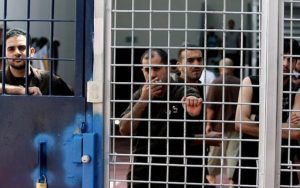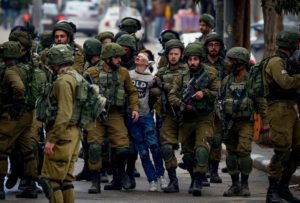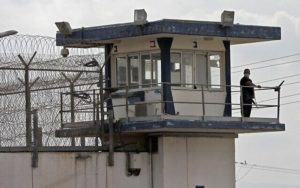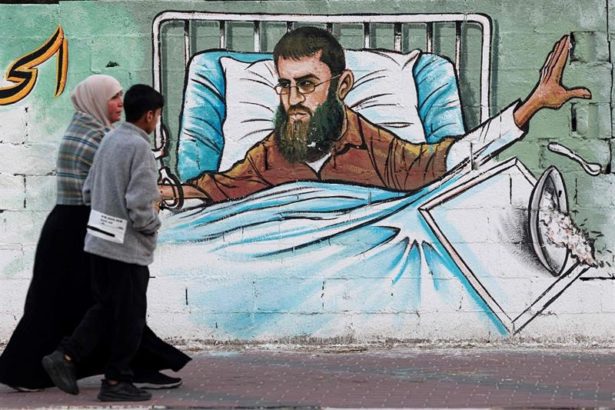The death of hunger striker Khader Adnan underscores Israel’s totalitarian laws regarding Palestinians, the massive overuse of administrative detention, the criminalization of peaceful resistance, and the cruelty of the prison system…
Nearly 56 years ago Israel issued Military Order 101 – still in effect today – that forbids Palestinians from normal activities, like gathering in a group of more than ten people, if that gathering “could be construed as political,” or displaying a Palestinian flag, without a permit.
The order also forbids the publication of any material “having political significance” – even in a Palestinian newspaper or on social media…
Another military order empowers Israeli authorities to imprison Palestinians for “incitement” if they try to “influence public opinion” in a way not to Israel’s liking, or if they express support for organizations Israel does not approve of…
by Kathryn Shihadah
If the world is to learn anything from the life and death of Palestinian hunger striker Khader Adnan, it is this: that the Israeli military system is irreparably immoral and irredeemable.
Khader Adnan attempted to call attention to this fact, and was thwarted at every turn.
Nearly 8 of Adnan’s 45 years were spent behind Israeli bars, including over 400 days on various hunger strikes. Most of that time was spent under administrative detention – a practice that circumvents due process.
When he was detained on February 5, 2023, Khader Adnan immediately began a hunger strike in protest – his last. According to his wife, Randa, Israel responded by preparing an indictment for him, apparently in the hope that he would end his strike and behave like a proper prisoner. No publicity, no negotiation, no PR disaster.
Israeli authorities provided a list of charges – not for terrorism or even using a weapon, but for membership in a Palestinian organization Israel considers illegal, and for “incitement” – largely consisting of peaceful public events for prisoners, memorial ceremonies, visits to families of martyrs, and funerals.
Adnan was undeterred. He found the trumped-up charges to be just as illegitimate as administrative detention, and vowed to continue his protest until the charges were dropped.
The indictment that Israel hoped would silence him only served to highlight another of Israel’s ruthless policies toward Palestinians: the criminalization of peaceful resistance.
Adnan exposed not only the injustice of administrative detention, but also the facade of the Israeli military legal system, in which any action that does not serve Israel may become a punishable offense.
And in green-lighting Khader Adnan’s death, Israel has now also exposed the cruelty – and apartheid nature – of its entire system.

Administrative detention
The first target Adnan set his sites on, administrative detention, allows a prisoner to remain in custody indefinitely without charges or trial.
Military Order 1651authorizes Israeli personnel to detain Palestinians if they have “reasonable grounds to believe that a certain person must be held in detention for reasons to do with regional security or public security” – parameters so vague that they could apply to just about any activity.
While international law allows for the use of administrative detention only in rare cases, Israel detains Palestinians as a matter of course (a practice for which Israel has been criticized widely by international organizations). Amnesty International calls it a “cruel, unjust practice which helps maintain Israel’s system of apartheid against Palestinians.”
International law also demands that, on the rare occasion that a person is administratively detained, s/he must be “informed promptly” of the reason for the detention. This is significant, since the right to “challenge the lawfulness of [one’s] detention…is an essential element of the right to liberty of person.”
But Israel rarely discloses to Palestinian detainees the reason for their detention. Rather, authorities claim to have “secret evidence” which neither the prisoner nor his lawyer is allowed to see – most of the time no one ever opens the file. A Palestinian may be held for months or years, and then released, without ever knowing why.
Jessica Montell, head of the Israeli human rights organization Hamoked, recently called Israel’s use of administrative detention, “simply an abuse of what should be the exception to the exception…[it’s being] run like an assembly line.”
“The obvious conclusion,” wrote the editorial staff of Israeli newspaper Ha’aretz in criticism of the practice, “is that it is easier and more convenient for Israel to detain Palestinians without conducting legal proceedings against them.”
Israel is, at this moment, holding 1,016 Palestinian prisoners under administrative detention (the highest number in 20 years) – and another 3,884 political prisoners (160 of them are minors).
Recently, Israel also held a record high number of Jewish Israeli administrative detainees: four. Israeli leaders lobbied for their release: National Security Minister Itamar Ben-Gvir stated: “It is not democratic to arrest a person and throw him in prison without evidence and without a trial.” Ben-Gvir added that he would try to persuade the relevant authorities to release them.
When Khader Adnan was indicted, he was no longer in that awkward legal limbo of “administrative detention.” Israel considered him a legitimate prisoner awaiting trial. Adnan found nothing “legitimate” about it, and called for a dismissal of all charges.

The criminalization of Palestinian civic consciousness
Khader Adnan was just one of hundreds of thousands of Palestinian men (as well as many women and children) who have wasted years mired in the Israeli military court system for no valid reason.
Nearly 56 years ago, when Israel had first occupied the Palestinian territories, the state issued Military Order 101. The order – still in effect today – forbids Palestinians from normal activities, like gathering in a group of more than ten people, if that gathering “could be construed as political,” or displaying a Palestinian flag, without a permit.
The military order also forbids the publication of any material “having political significance” – even in a Palestinian newspaper or on social media.
Another military order empowers Israeli authorities to imprison Palestinians like Khader Adnan for “incitement” if they try to “influence public opinion” in a way not to Israel’s liking, or if they express support for organizations Israel does not approve of.
A civil law enables Israel to slap stone-throwing Palestinians (but not Jews) with a sentence of up to 20 years. [Go here for more on discriminatory laws, and here to read Amnesty International’s apartheid report.]
A bill under consideration in the Israeli legislature right now would endorse the death penalty for Palestinian prisoners that Israel considers a “security threat” to the maintenance of the occupation.
Khader Adnan put his life on the line in protest of these egregious policies, which outlaw Palestinians’ civic aspirations and any attempts to resist their oppressor (resistance that is codified under international law).

Israel’s contempt for Palestinian life
Israel knew Adnan was near death, and made calculated choices to bring it about. Eyewitnesses to his demise have declared it a “willful” and “deliberate” killing. Israeli prison authorities denied him the medical attention he required, and burdened his weak body with unnecessary strain, including torture.
Khader Adnan was not an isolated case.
Over 230 other Palestinians have died in Israeli prisons, many due to medical neglect or torture.
Over 1,000 Palestinians are currently under administrative detention, imprisoned without a chance of due process.
3,900 more are political prisoners, sentenced or awaiting trial in a military court overseen entirely by Israeli Jews and conducted in Hebrew, that boasts a 99.6 percent conviction rate.
Over 800,000 Palestinians – 40 percent of the male population – have been detained or arrested.
95 percent of Palestinian prisoners are tortured, including two-thirds of children.
Over 400 Palestinian organizations, including all of the major Palestinian political parties, have been declared illegal by Israel – and thousands of Palestinians have been arrested for participating in these groups.
Israel has flipped the script on Palestinian hunger strikers by referring to them as “terrorists,’” and their nonviolent strategy as a “new type of suicide attacks.”
In short, if you are Palestinian, any action can be criminalized. Adnan is just the latest fatality.
Kathryn Shihadah is an editor and staff writer for If Americans Knew. She also blogs at Palestine Home.
FURTHER READING ON PALESTINIAN HUNGER STRIKES:
- Why were these Palestinian prisoners willing to die of starvation?
- Palestinian hunger strikes: growing resistance against growing Israeli crimes
- Palestinian prisoner reaches deal with Israel to end his detention, concludes hunger strike
- Palestinian on hunger strike in Israeli jail ‘on verge of death’
- AP and Amnesty International: Are you just waiting for him to die?
FURTHER READING ON ADMINISTRATIVE DETENTION:
- American senior citizen from Ohio held by Israel since 2021
- For Over a Year, Israel Has Jailed a Palestinian Teen With a Rare Disease. There’s No Trial in Sight
- Israel is Afraid of Khalida Jarrar
- Israel Police Prevented Palestinian Detainee from Breastfeeding Her Baby
VIDEOS:





